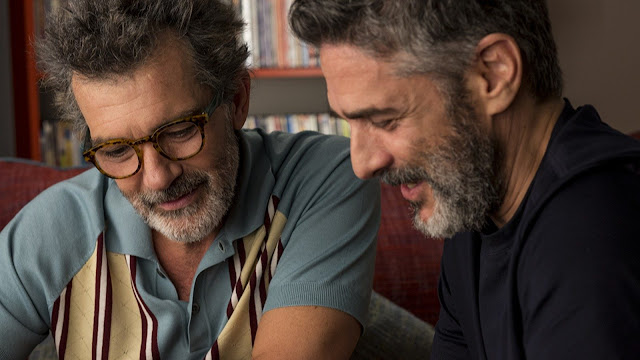The completely disgusted glare a bank robber gives Nicole Kidman as a splash of purple dye explodes in slow motion around him and the drop of a bag before he re-enters the bank. “Destroyer”
Customers in a dilapidated movie theater slipping on 3D glasses, which serves as our key to do the same for an extended 50 minute long take through the somnambulist mind of our male protagonist in “Long Day’s Journey Into Night”
From the window of a small prop plane, Joe Pesci’s car held in a slow pan to the left as it disappears from view. “The Irishman”
In “Apollo 11”, the readings of heart rate and blood pressure from each astronaut. And Buzz Aldrin coming in at a cool 88 compared to Neil Armstrong’s 110.
Greta (Isabella Huppert) standing completely motionless in the street, a gargoyle keeping watch over her prey (Chloe Grace Moretz) in Neil Jordan’s potboiler deluxe “Greta”
“The Beach Bum”- Sprinkled in red light, Moondog (Matthew McCoughnahy) and Lingerie (Snoop Dogg) wax poetic against a dark blue sky with Miami’s lights twinkling in the background. It may be a frayed interpretation of life at the margins, but Harmony Korine envisioned some of the year’s most precisely imagined images
A stuffed animal tiger becomes a full sized one- and the gasp that Estrella (Paola Lara) emits when she first sees him lying in front of her. “Tigers Are Not Afraid”
“Little Women” Two timelines of running down the stairs with drastically (and heartbreaking) different results. Just one of the many thrilling ways Greta Gerwig plays with her literal translation.
“But what about the Ken Burns documentary we were gonna watch tonight?” “Fuck The Dust Bowl” “Booksmart”
In “Caballerango”, the camera observing a horse on a ridge line, and then the sudden shift to catch it as it momentarily runs out of view.
The guttural, howling cry of a woman (Florence Pugh) doubled over on the lap of her boyfriend as the camera slowly pans out the snowy window behind them. “Midsommar”
Otis (Noah Jupe) translating the voices of his sparring parents during a contentious phone call. Humor and incisive trauma inflicted all at once. “Honey Boy”
A woman (Jillian Bell) seeing herself in the reflection of a pretzel cart. “Brittany Runs a Marathon”
The needle drop of a Scott Walker song that harmonizes perfectly with the drugging of a john in “Hustlers”
Waiting in the hallway for an old lover to ascend, the way Salvador (Antonio Banderas) wipes at his face and goes through a range of emotions. “Pain and Glory”
Emily (Taylor Russell) telling her father (Sterling K. Brown) that she could have stopped the horror that shattered their lives and the way she breaks down. “Waves”
The canvas of boats that sail out to meet and bring home the “Maiden”
In “Marriage Story”, Adam Driver singing “Being Alive”, and then impulsively running back to the microphone after starting to sit down, as if when he stops singing, his marriage will be over.
“Geminin Man” and a motorcycle chase through the streets
A slow pan backwards through a group of white-dress clad people standing in front of their respective slots at an outdoor dinner table, and then the slight bow along with them as they all take their seats in unison. In Ari Aster’s “Midsommar”, his camera is just another specter.
“The Last Black Man In San Francisco”- A man preaching fire and brimstone next to a garbage-filled Oceanside while standing on a milk crate, and the slight smile and wave he gives as a car passes by, breaking his momentary anger into neighborly gesture
“Tigers Are Not Afraid” - Fish swimming in the muddy water of a puddle.
Tao Zhao and the way the camera fiercely lingers on her as she steps from the backseat of a car and fires a gun in the air, then proceeds to walk around the car and prevent any more harm coming from a gang of thugs in front of her. “Ash Is Purest White”
A room full of lawyers easily ordering from a lunch menu, and then the slow confusion of Henry (Adam Driver) not knowing what he wants. “Marriage Story”
“You don’t know how good of a friend you got here.” “Oh, I know.” No, you DON’T’ know.” Harvey Keitel basically telling Frank Sheeran (Robert DeNiro) ho close he came to being killed. “The Irishman”
An underwater swim that transitions from nervous flirtation to crushing realism… and the look that Katherine Devers gives upon surfacing. “Booksmart”
Pretty much anything Martin Lawrence did in “The Beach Bum”, but especially saying “be careful, you may shoot a dolphin” when MoonDog fires a gun into the air on his boat.
Amy (Florence Pugh) sternly describing how marriage is an economic proposition. “Little Women”



















